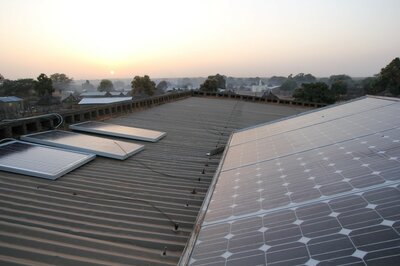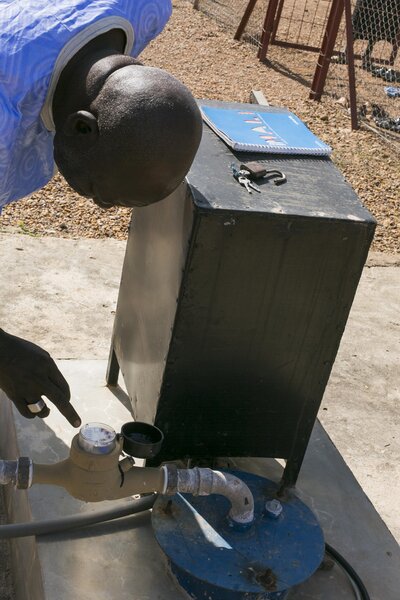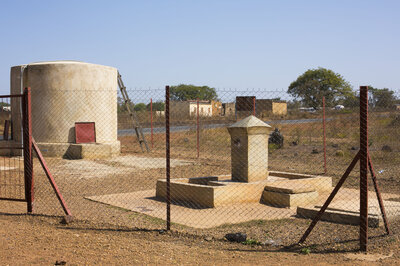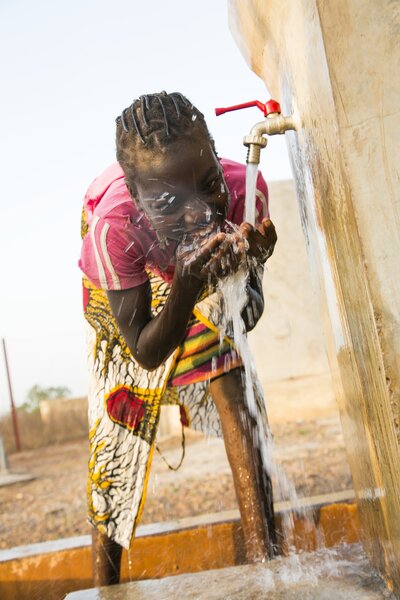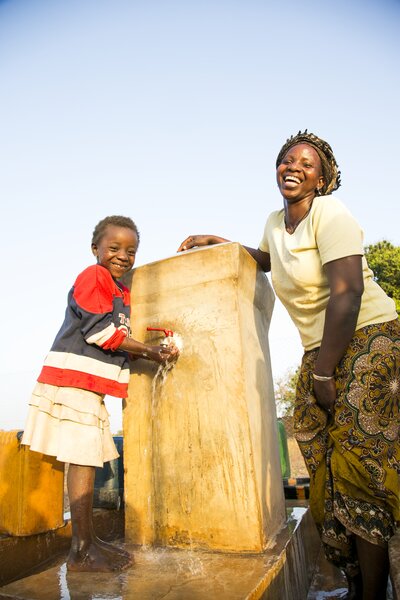It is still pitch dark in Faradiélé, a little village in southwestern Mali. The crickets are chirring. Now and then I can hear the hoarse “hee-haw” of a donkey. The first cocks are crowing. In Mamou Sangaré’s clay hut, her youngest daughter Nani turns over in her sleep and tries to snuggle up to her mother again, but Mamou gently slips away, stands up, gets dressed, ties a cloth around her head and steps outside. Soon I hear the rhythmic sound of brooms sweeping the yard.

The women of this extended family are sweeping the yard, as they do every morning. When I step out of the house too, I’m presented with a surprising sight: in order to see anything at all, each of the women has wedged a flashlight between her neck and shoulder. Clouds of dust are illuminated by the pools of light from the flashlights. Darkness surrounds us.
At around seven o’clock the children emerge from the huts with sleep still in their eyes. Kneeling, they wash up with water from a jug. The big kids help the little ones. In their midst stands Zé, Mamou’s husband, cleaning his teeth with a twig. For breakfast there is rice with peanut sauce, the reheated leftovers from last night. The horizon has turned red by now. A new day can now begin.

Water thanks to solar power
The days did not always begin this serenely and this late in the front yard. When Mamou was still a girl, she had to get up to fetch water at four in the morning or even earlier. “My mother always tried to be first at the waterhole,” she recalls. “In those days the water was still relatively clean. When someone got there before her, she’d have to wait till the mud had settled again. And often there wasn’t enough water for everyone.” Mamou laughs heartily while describing the situation to me. She’s always laughing. Mamou has the most infectious laugh in all of Faradiélé.
Mamou Sangaré, housewife and micro-entrepreneur
There is enough groundwater in this area, but no water available in the dry season without a well. Climate change has made the dry season unpredictable. The river carries less water and dries out. During the rainy season, the water does not rise as high as it used to. There are fewer trees in the village than there were ten years ago. “Last year the rain came much too late,” says Ousmane Makan Sidibé, the local Helvetas project manager. “Even the bees gathered round the new well because there wasn’t any water left anywhere else.”
In 1987 the village built its very first well with help from Helvetas. But that well is getting on in years, and now breaks down a lot, sometimes as often as every other week. Replacement parts are hard to come by. “We were looking for a solution that’s reliable and cost-effective. And one that brings a real improvement for people here,” recounts Ousmane. Naturally it would have been possible to replace the old foot pump. But Ousmane, whom everyone knows to be a tinkerer, would not settle for the first available solution. He drummed up specialists in various domains – engineers, experts in construction and solar technology – to brainstorm. The solution they came up with was an innovative combination of existing technologies: drilled well, solar-powered pump, cistern and tap stand.
This tap stand is located right between the school and the healthcare center, on the roof of which the solar panels are mounted. The energy generated by the panels powers an electric pump that starts operating as soon as the water in the cistern sinks below a certain level. The start is triggered by a simple float gauge, like the ones we’re familiar with from the flushing tanks of our toilets. From the cistern, which was built by local craftsmen, the water is carried to the tap stand, where the women can simply open either of the two taps.
At 20,000 Swiss francs (roughly $21,000), the price of the solar-powered pump far exceeds that of a foot- or hand-operated pump. “But this solution will prove considerably less expensive within five years because the system requires much less maintenance,” explains Ousmane. Since August 2014, the Helvetas team in the region have built four more solar-powered wells. “And we’ve never had a technical problem with any of the five wells,” adds Ousmane. “The pumps function reliably.”
Shortly after the well attendant, Yacouba Diarra, opens the fence that keeps the goats, chickens and cows away from the well, Mamou and two of her children walk over to the solar-powered water pump. The three of them take off their shoes before entering the fenced-in enclosure. They can’t allow anything to spoil the water quality they have finally attained in the village.
Djakaridia, her eldest son, pushes a jerry can under the tap and casually leans on the pump, filling up the can in no time. Meanwhile, Nani, his 7-year-old sister, is playing with some other girls, and Mamou is chatting with the women there. For a year and a half now, fetching water in Faradiélé has actually become almost a pleasure.
Only gradually are the effects of the new, unfamiliar and fascinating solar technology on village life becoming apparent. Has the modern well grown in people’s esteem? Are they more involved in its upkeep? At any rate, it’s still not a matter of course for Mamou’s eldest son to help fetch water... because he’s a boy. Mamou responds to my remark about that with her typical queen-size laugh.
Radiant and respected
At noon Mamou is sitting at her little stall in the center of the village. She has been frying beignets all morning. She keeps the oil hot on a small wood-burning stove she built herself. She takes one portion of little cakes after another out of the pot whilst cheerfully exchanging pleasantries with each customer. Her assortment goes well beyond beignets. One neighbor needs Maggi cubes, for example. A young man comes over to buy fish, a motorcyclist stops for a bunch of onions, some women order rice for Mamou to deliver the next day.
As there is not enough room to seat all the village children at the desks at the same time, school lets out for the morning section at noon, whereupon the afternoon section heads over to take their place. Chaos reigns briefly at Mamou’s stall. A few of the children can afford to buy beignets, while the others try to wheedle some of the fried treats out of Mamou for free. With help from her mother-in-law, she gets a handle on the gang of little rascals – firmly, but of course with a laugh.

Korotoumou Samaké, Mamou’s mother-in-law
Mamou and her husband Zé are highly respected in the village. “Both of them have an enormous amount of drive and do a great deal for the whole village,” says Fatoumata Seydou Koné, who serves as hygiene counselor on behalf of Helvetas in Faradiélé and eight other villages. For the new well, villagers need to learn how to keep the good water clean during transport and in the home. Fatoumata shows them how to do it, and how to stay healthy. She has organized various events for the whole village, for the women, for the schools. “I rehearsed a whole play with a few other women,” she recounts. “And the film screenings always draw a big crowd.”
In Faradiélé, where there is hardly any entertainment, a film screening is a major event that nobody wants to miss. This is a good thing for Fatoumata – and for hygiene. In addition, Fatoumata banks on role models in the village, such as Mamou and her husband Zé. And it works: regular handwashing, the first rule of healthy living, is now a matter of course in the village. As is the knowledge that every family needs a latrine.
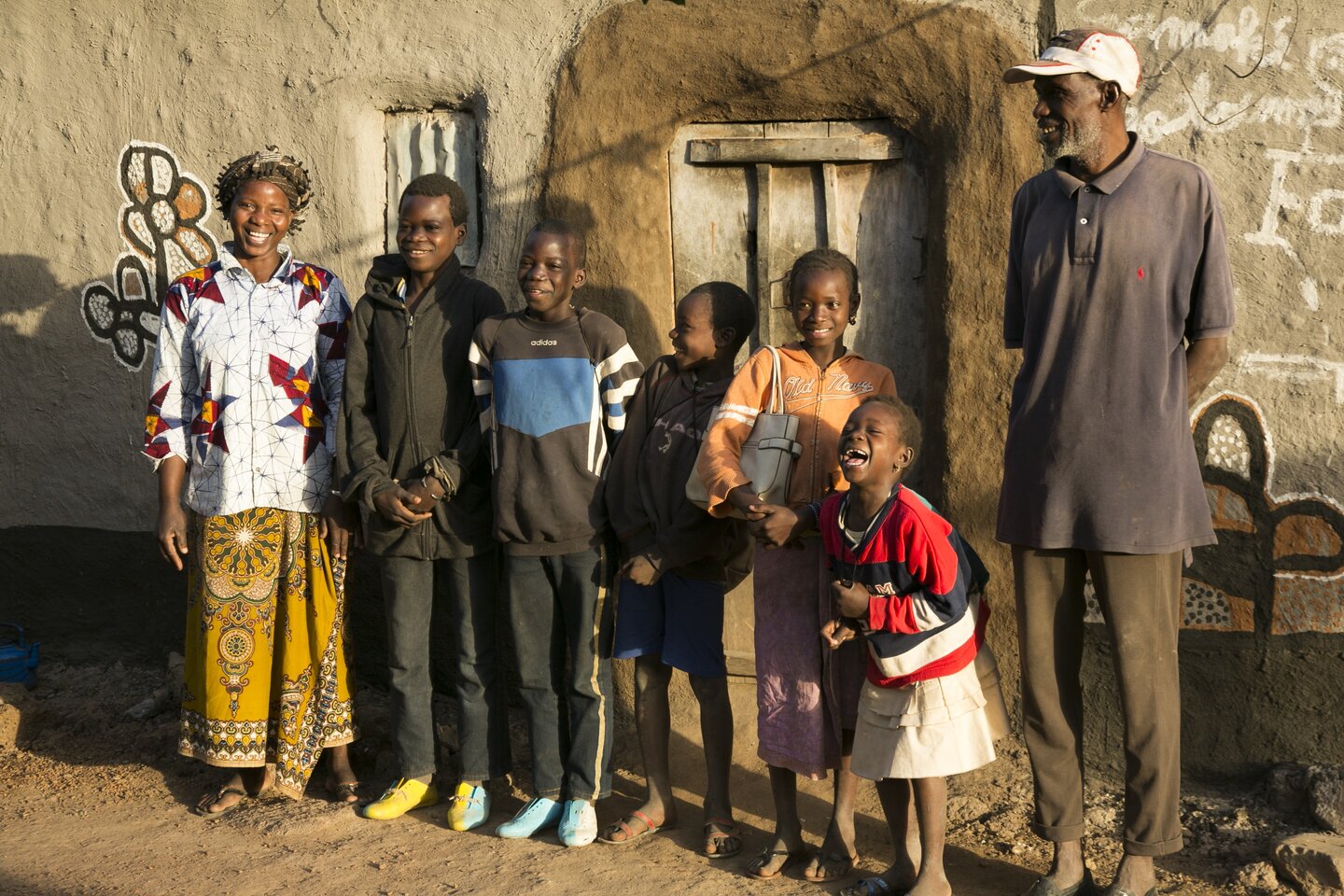
Coveted water
Late afternoon. School is now over for the afternoon section, too. Before going home, the children walk over to the solar-powered well to fetch water for the next day at school. 11-year-old Kadiatou, Mamou’s eldest daughter, is among them. She likes going to school and tells me self-confidently that she wants to be a doctor someday. But now it’s time to fetch water. A teacher stands at the fence to maintain discipline at the well. He does not let more than three children at a time into the enclosure. The smallest kids help carry water too, although their jerry cans and jugs are often so big it is hard to imagine how they can possibly lift them at all.
A boy in an FC Barcelona T-shirt and a large suit jacket is casually trying to jump the queue. In vain: the teacher brings him back into line. Now a chicken has taken advantage of the brief confusion to enter the enclosure. The children shoo it away with a loud clamor. But the next problem is already waiting at the fence: the goats and cows are thirsty, and every open vessel is an open invitation. The children defend their water, throw stones at the animals and make sure to get away as fast as they can. Mamou’s two eldest boys are in the yard playing with a soccer ball they made out of scraps of plastic. Tropical evenings are short, and soon it is pitch-black night. Mamou’s favorite dish, polenta, is cooking in a pot on the open hearth. After dinner it is soon time for bed. The family needs to save the battery, which powers a single light bulb.
“So what are your plans for the family?” I ask the couple. “I’ve signed Mamou up for the literacy course,” says Zé. Mamou didn’t want to, he adds. She said that she’d struggled through just fine so far without reading and writing and that she had more important things to do than going to school. “He eventually convinced me all the same,” she says, laughing. And Zé is visibly delighted that his wife can laugh at herself. Like every mother, Mamou wants only the best for her children. “Even if they remain farmers,” adds Zé, “they need a solid education as a basis for their future. But the main thing is they should keep healthy.” Mamou quite agrees. Which she does – how else! – with a hearty laugh.



